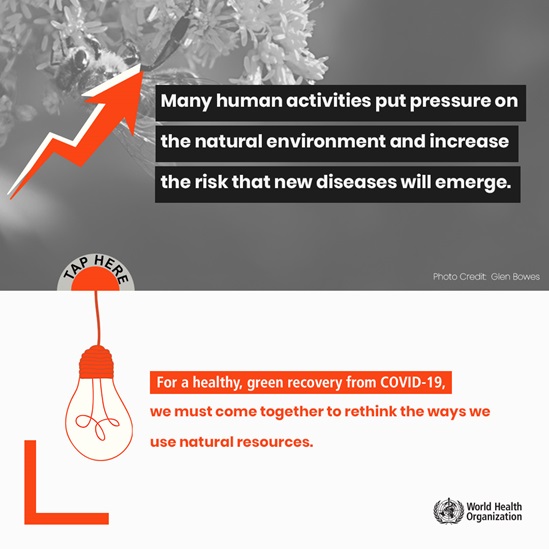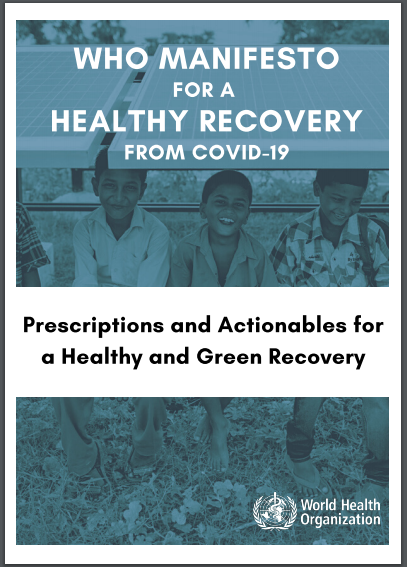Manifesto prescription 1: Protect and preserve the source of human health: Nature
Economies are a product of healthy human societies, which in turn rely on the natural environment - the original source of all clean air, water, and food. Human pressures, from deforestation, to intensive and polluting agricultural practices, to unsafe management and consumption of wildlife, undermine these services. They also increase the risk of emerging infectious diseases in humans – over 60% of which originate from animals, mainly from wildlife. Overall plans for post-COVID-19 recovery, and specifically plans to reduce the risk of future epidemics, need to go further upstream than early detection and control of disease outbreaks. They also need to lessen our impact on the environment, so as to reduce the risk at source.
Actionables
Biological diversity
- Implement and update National Biodiversity Strategies and Action Plans (NBSAPs) in line with the 2011-2020 Strategic Plan for Biodiversity and the 20 Aichi Biodiversity Targets.
- Incorporate biodiversity values, ecosystem protection and the ‘value of nature’ into national and regional policies, strategies and programmes, including in public health policies and in national accounting and reporting systems.
- Eliminate or reform incentives, including subsidies that are harmful to biodiversity, including those that promote monoculture production systems.
- Avoid ecosystem loss and degradation and promote ecosystem integrity and resilience and protection of species.
- Limit or control human-wildlife contact to reduce the risk of infectious diseases, including zoonotic and vector-borne diseases.
- Promote agrobiodiversity and the use of integrated pest management to reduce the need for chemical pesticides and herbicides.
Climate change
- Mitigate climate change by reducing greenhouse gas emissions and other climate changing pollutants like black carbon for example through better energy-use choices, agricultural practices, transport, food, city compactness and industrial technology use and practices.
- Implement sustainable infrastructure development and spatial planning to avoid locking societies into greenhouse gas-intensive emission pathways that may be difficult or very costly to change.
- Establish and enforce air quality standards, in line with WHO’s Air Quality Guidelines. Adopt very low energy building codes for new buildings and retrofit established buildings.
- Improve the efficiency of material use, recycling and re-use of materials and products and increase overall reduction in product demand.
- Provide climate resilient health and sustainable infrastructure, technologies and services. These may include water and sanitation services, energy supply and waste management technologies.
- Reduce deforestation and implement afforestation and sustainable forest management.
- Ensure and promote enabling environments for behaviour change related to choices of energy use, transport, living, and food, waste generation and general consumption.
Sanitation
- Develop and implement multi-sectoral sanitation policies which include sanitation safety planning, treatment of faecal sludge and wastewater, and reuse in agriculture.
Air pollution
- Develop coherent multi-sectoral policies and actions across transport, industry, power generation, waste and wastewater management, agriculture, housing and land use sectors for preventing air pollution. Also develop and implement policies to ensure clean fuels and technologies for cooking, heating and lighting in households .
Chemicals
- Implement the WHO Chemicals Road Map to enhance health sector engagement in the sound management of chemicals.
- Implement the chemicals and waste-related multilateral environmental agreements, particularly their health protective aspects, e.g.:
- Minamata Convention on Mercury.
- Basel Convention on trans-boundary movements of hazardous wastes and their disposal.
- Rotterdam Convention on the prior informed consent procedure for certain hazardous chemicals and pesticides in international trade.
- Stockholm Convention on persistent organic pollutants (POPs). - Implement the International Health Regulations (2005), a legally binding agreement providing a framework to better prevent, prepare for and respond to public health events and emergencies of potential international concern, including chemical events.


